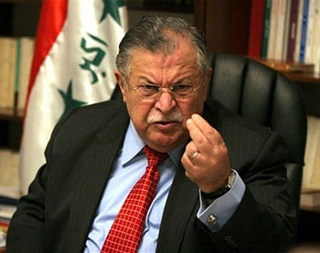Cites public scorn for military meddling
MANILA, Philippines—Take it from Marcos’ martial law administrator himself.
Filipinos won’t accept a junta even if the May elections fail and produce no successor to President Gloria Macapagal-Arroyo, according to Senate President Juan Ponce Enrile.
Enrile acknowledged that a military takeover was possible in a tense situation, such as a failure of elections.
But the people have rejected the idea of a military-controlled government since EDSA I, said Enrile, the defense secretary when Ferdinand Marcos declared martial law in 1972 until he broke away from the dictator in 1986, which led to a popular uprising that toppled Marcos.
“A military junta that would grab power for itself would be totally unacceptable to our people because it is contrary to our longstanding democratic tradition,” the senator said in a statement sent to the Inquirer.
Backpedaling
Although a military takeover was possible, “our own experience since 1986 tells us that Filipinos do not take kindly to any form of military intervention in our political life,” Enrile added, backpedaling on the views he expressed a week before the 24th anniversary of the EDSA People Power Revolution.
Last month, he said that the Armed Forces of the Philippines and the Philippine National Police could intervene and choose an acting head of government in case of a massive failure of elections.
Enrile mentioned Article II, Section 3 of the 1987 Constitution, which states that the AFP is the “protector of the people and the State.”
Should elections fail, Enrile said in February there would be no civilian authority on June 30 when Ms Arroyo’s term ends because there would be no President, Vice President, Senate President and Speaker.
“The only authority that you have are those with guns except they are the most organized people in the bureaucracy,” he told ABS-CBN last month.
They are the “permanent institutions” and the only ones who could “control the country at that point,” he added.
Enrile said the AFP chief of staff and the PNP director general then could pick a civilian authority “to administer the government in transition.”
“The Constitution is just a piece of document and if it is not enforced, nothing will happen,” he said. “Who will enforce the Constitution? It is the police and the military if there is no civilian authority that can enforce.”
Speculation of a plot to extend Ms Arroyo’s stay in power with the support of the newly named AFP chief of staff, Gen. Delfin Bangit, and other generals loyal to him was fueled when the President’s deputy spokesperson cited Enrile’s statement of a possible military takeover.
Charito Planas said on March 19 that a military takeover could take place in case of a power vacuum due to a failure of elections.
Turnaround
In a turnaround, Enrile, who is seeking reelection under Joseph Estrada’s political party Pwersa ng Masang Pilipino (PMP), said on Sunday the military and the police would remain under civilian authority even if the President’s term ended on June 30 with no clear elected successor.
“The continuing government in the Philippines is the Cabinet. That is not replaced until the next President replaces it even if (Ms Arroyo’s) term ends,” Enrile told reporters who followed the PMP sortie in Cotabato City.
He said the defense secretary, a civilian, would continue to oversee the military while the interior secretary and concurrent chair of the National Police Commission, also a civilian, would supervise the police.
Enrile said people should stop talking about failed elections and the military taking over as this would only cause divisiveness.
“In the first place, there’s no legal justification for the military to intervene in the unlikely possibility that the May elections would fail. The line of succession would still be intact until June 30,” he said.
New Senate president
Enrile earlier said that in case of an election failure, he would call for a joint session of Congress during which he would resign to pave the way for the election of a new Senate president whose term would go beyond June 30. (Twelve senators, or half of the 24-seat Senate, are serving until 2013.)
Enrile’s term, like those of Ms Arroyo, Vice President Noli de Castro and Speaker Prospero Nograles, ends on June 30.
The Vice President, Senate president and the Speaker are mandated by the Constitution to be in line to succeed the President if he or she is no longer able to discharge the functions of his or her office.
With De Castro, Enrile and Nograles’ terms all due to end on June 30, only a newly elected Senate president whose term runs through 2013 could take over as the country’s acting President in case of failed elections.
Military support
Enrile indicated that the Senate president as acting President should have the support of the military and the police in the tense aftermath of an election failure.
“If he is not respected by the military, he will be inutile. If he is not respected by the police he will be inutile. He will be a stepping mat,” Enrile said.
He said former Presidents, and business and religious leaders should have a hand in choosing the acting President. “At least there is a semblance of popular will,” he said.
The scenario would hold “until an election is held again to select the true President of the country,” Enrile said.
“But as I said we will know that after the May 10 elections. Right now, nobody can say that there is a failure of election. It’s all speculation,” he said.
Enrile called on the Commission on Elections, the government and the opposition to ensure that the country’s first automated elections would be clean, peaceful and orderly.
He urged all political parties, electoral watchdogs and civil society to maintain vigilance so that the true will of the people would be reflected in the election results.
“If we can pull off the nationwide automated elections, we mark another phase in the development and maturation of Philippine democracy. There can be no turning back,” Enrile said.
Define failure
History will judge Ms Arroyo “unkindly” should a junta arise if the May 10 polls end up a failure, Sen. Joker Arroyo said Sunday.
And this early, the senator wants the Comelec to “define what constitutes” an election failure under the first automated polls in the country.
Interviewed over dzBB radio and by the Inquirer later, Arroyo said the Comelec should define what constitutes “failure of election” to spare Congress from debating on the matter in the event it happened.
Congress is scheduled to hold sessions from May 31 to June 4 to canvass election returns for the presidential and vice presidential races, and proclaim the winners.
“Otherwise, there will be no end to the debates in Congress,” Arroyo said. With a report from Christine O. Avendaño
 In Iraq’s parliamentary system, the raw vote totals are actually of minor consequences, however, as the number of seats is determined on a provincial basis and the party with the most seats, not the most votes, gets first crack at forming a new government. In that regard the two blocs are running virtually neck-and-neck, and the final result will likely be no more than a 1-2 seat swing one way or another.
In Iraq’s parliamentary system, the raw vote totals are actually of minor consequences, however, as the number of seats is determined on a provincial basis and the party with the most seats, not the most votes, gets first crack at forming a new government. In that regard the two blocs are running virtually neck-and-neck, and the final result will likely be no more than a 1-2 seat swing one way or another. To that end both blocs will be courting the seats of the Iraqi National Alliance, the bloc once dominated by the Supreme Islamic Iraqi Council (SIIC). Smaller factions with seats will include the Kurdistan Alliance, the Gorran Party, the Iraqi United bloc and the Iraqi Accord Front. Eight seats will also go to religious minorities.
To that end both blocs will be courting the seats of the Iraqi National Alliance, the bloc once dominated by the Supreme Islamic Iraqi Council (SIIC). Smaller factions with seats will include the Kurdistan Alliance, the Gorran Party, the Iraqi United bloc and the Iraqi Accord Front. Eight seats will also go to religious minorities. The Shi’ite religious INA overall is seen as a more natural ally to the Shi’ite religious State of Law, but
The Shi’ite religious INA overall is seen as a more natural ally to the Shi’ite religious State of Law, but  Yet while the narrative of the improving situation in Iraq is a very popular one, Iraqi civilian deaths actually jumped dramatically over the past month,
Yet while the narrative of the improving situation in Iraq is a very popular one, Iraqi civilian deaths actually jumped dramatically over the past month, 


